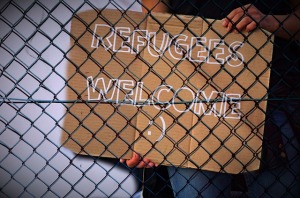Who Do You Love?
 I have a friend who is one of those guys who intentionally lives his life care-free and unfettered. At age 35, he is not married; he has no children. Though he’s very well-educated he doesn’t go in for the boring old traditional rat race the rest of us run day in and day out. Instead, he works to take care of what he needs and spends the rest of his time surfing or hunting or gardening or traveling. It’s a way of life that allows for lots of flexibility and spontaneity.
I have a friend who is one of those guys who intentionally lives his life care-free and unfettered. At age 35, he is not married; he has no children. Though he’s very well-educated he doesn’t go in for the boring old traditional rat race the rest of us run day in and day out. Instead, he works to take care of what he needs and spends the rest of his time surfing or hunting or gardening or traveling. It’s a way of life that allows for lots of flexibility and spontaneity.
To be able to live the way he does, my friend is always looking for unusual work and living opportunities that might allow him this freedom he values so much. Recently, a family friend inherited a long-neglected house from a distant relative and had to find a quick solution to get it up to code before the city condemned the building. The first call he made was to my friend Jake, who now lives in the dilapidated house for free in exchange for fixing it up.
Sounds like a great deal for Jake, but let me tell you: you or I might not ever want to live in this house. You can see the ground through the floorboards; the house is inhabited by myriad critters—and not just little ones; and because of its age and disrepair it has certain, well, quirks…like leaking plumbing requiring one to run downstairs and turn on the water before running back upstairs to flush the toilet then running back downstairs, quick, to turn off the water again. As I mentioned, most of us might not share Jake’s enthusiasm about his good fortune in finding such a living situation.
But Jake is young and unencumbered! He doesn’t have a family to worry about or many large expenses to handle. He has hours and hours of free time on his hands. This situation might not work for the average person, but for Jake…well, it’s just fine.
The day that Jesus got up to preach and said something like what we read this morning in our Gospel lesson, he was certainly received with puzzled expressions from listeners thinking about responsibilities and expenses and budgets and feeding and clothing their families. These famous teachings of Jesus are so jarring that even a casual, cultural Christian will find at least some paraphrase of, “don’t worry about tomorrow—tomorrow has enough worries of its own” or “don’t worry about what you will eat or drink” or “do not store up treasures on earth” familiar.
And they are so familiar to us that one either repeats the words piously with no real intention of ever taking them seriously, or dismisses them altogether as the wishful thinking of a man who, like my friend Jake, did not have a family to feed or very many obligations to the community hanging over his head or any real pressing material needs to speak of at all.
There Jesus was, golden boy of Nazareth, traveling the countryside with his trusty group of disciples, sleeping wherever they could, depending on the kindness of friends and strangers alike, and viewing each day as a whole new adventure in finding what they needed to survive. It all sounded just a little exciting to not worry about where your next meal was coming from—for someone like Jesus!
Of course he could sit up at the top of the rise and say things like, “do not store up for yourselves treasures on earth.” What did he know about financial obligations, about hungry mouths to feed, about the volatile economy that could pull the rug right out from under you with no notice whatsoever? Good for him that he could be so footloose. But there’s no way Jesus’ words have any real, modern day relevance for the rest of us!
It’s true: there are a lot of hard, challenging words assembled in these few chapters in the middle of Matthew, part of the gospels we often call The Sermon on the Mount. And perhaps some of the hardest come up in today’s passage. Many scholars would say that the verses we heard today, from Matthew chapter 6, are the heart of Jesus’ teachings on material wealth—that is, how and why and how much we acquire possessions and money. Jesus talks a lot about that sort of thing all throughout the New Testament, but it’s here in these verses that he pulls no punches.
In Matthew’s account, these teachings of Jesus come solidly within the second half of The Sermon on the Mount. So let’s remember what comes before them: The Beatitudes, a reminder to be salt and light in the world, teachings on divorce and adultery, instruction to love your enemy, warnings against showing off your piety in front of everyone. Then, at the beginning of this little section, Jesus lays it out straight: don’t store up treasures on earth, don’t even think you can serve two masters, God and money…because you can’t.
It’s right then, right in the middle of our passage today, that Jesus uses a little word that has great meaning—almost like the hidden key to unlocking the meaning of the text. It’s right there at the beginning of verse 25, the word “therefore.” And “therefore” means something like: “in light of everything you have just heard me say…”, or “because of all this…” or something like that. It’s like Jesus is saying in The Sermon on the Mount: “I am unfolding the wonder and potential of a brand new order of life, the Kingdom of God, and describing the upside down way of living it offers. Embrace it. Give your life to it. Open your heart to take it on as your mission and vision. Live it, to change the world. And, therefore, once you decide this way is the way for you…well, then, do not worry about your life, what you will eat or what you will drink…”.
See what Jesus is doing here? He’s not really talking about our material possessions or what we wear or if we’re thirsty. In fact, he’s saying that those questions are not the questions we should even be asking. Instead, if you choose to live in this new way—this Kingdom of God way—the question suddenly becomes totally different. The question is not “what do you have?” but “who do you love?”. Questions about possessions are inconsequential; the really urgent question is where your heart is.
Wait a minute.
Are we hearing right? Jesus was a single, unencumbered man who is not bound by responsibilities, right? What could he know about how much we worry? If he did, he wouldn’t say such strange things.
They scratched their heads back then on the hillside of Galilee. And we find Jesus’ words deeply baffling as well. After all, we are Americans. We pull ourselves up by our bootstraps. We live in the society of the little guy making good. We’ve been taught from early on that material security is critical, and that if we work hard enough we can make it happen by force of will! And more, material comfort is a sign of good character—well, maybe we wouldn’t come straight out and say it that way—but you know we all think along those lines. It’s the American way.
But…it’s not God’s way. This passage gives us a glimpse of the sharp contrast between the way God views the world and the way we tend to view the world. While God acts with lavish goodness to all of creation, we tend to live life only seeing the limits.
It may not surprise you when I point out today that we don’t tend to think the way God does. This economy of God is characterized by abundance, and this theology of abundance is just too scary for us. Rather, we like to spend money we don’t have to buy things we don’t need to impress people we don’t like. You and I are continuously grasping—we must try to have what it is we need, and not just what we need but also what we want. If I don’t grasp it, someone else will, after all.
The abundant model of unclenching fists and spreading the blessing of God around was very threatening for the folks sitting on the hill listening to Jesus that day; they, like us, could not imagine that security would be found anywhere other than grasping desperately to keep what they had…and to get more.
But that’s not God’s way; that’s a theology of scarcity. And in a theology of scarcity fists are closed, grasping continuously at what is readily available. And in a theology of scarcity distinctions start to arise, like classicism, differentiation between the haves and the have nots, the abuse of power for personal gain.
That’s exactly why Jesus changes the question altogether, pulling his listeners away from worry about material possessions and instead pushing us toward the question of where we place our highest allegiances, is because asking the question of who we love had nothing to do with an inventory of our possessions. In fact, the two might very well stand at odds. The kind of love Jesus was talking about here is the love that goes all out, with abandon. True and deep love, commitment…it requires a ceding of control—just opening up our hands and giving up any illusion that we can predict or control or manufacture our lives. This love demands utter trust and full surrender and it is risky, oh is it so very risky. The kind of love Jesus is talking about asks us to look deeply and ask: who rules our hearts? How are our priorities ordered? To what do we offer our deepest devotion and highest commitment?
What Jesus was talking about when he was going on and on about lilies and birds was not a single man’s carefree approach to vaguely irresponsible living. No, what Jesus meant was that when we change the question to ask instead who we love, we will soon find ourselves free from greed and fear—those qualities that fuel and preoccupy materialistic angst. Because the kind of love Jesus is talking about is one that turns it all over, gives it all away—not just materially but at the core of who we are—everything, utterly surrendered to God.
 Perhaps you’d agree that the news we are seeing lately is rather ironic, given the fact that we’re just on the edge of a season of Thanksgiving. You have been watching, as I have, the declarations of American leaders all over our country this week: “We don’t want Syrian refugees here—taking away our things and risking the safety of our communities because they’re terrorists! Keep them away.”
Perhaps you’d agree that the news we are seeing lately is rather ironic, given the fact that we’re just on the edge of a season of Thanksgiving. You have been watching, as I have, the declarations of American leaders all over our country this week: “We don’t want Syrian refugees here—taking away our things and risking the safety of our communities because they’re terrorists! Keep them away.”
I’d like to say, in the name of the one who asked us to consider who we love, to the 31 governors of US States that have declared Syrian refugees unwelcome, and 289 members of the United States House of Representatives, who voted Thursday to approve a bill effectively blocking Syrian refugees from finding safety in our country: shame on you.
The rhetoric these and other leaders are engaging in is fear mongering of the highest order, despicable in a way that’s hard to put into words. But this week I read a reflection on Facebook that managed to do it. Hear what Lorelle Saxena had to say:
“There is no reason, not one single reason, why I deserve shelter, food, stability, safety, health, or your regard any more than any given Syrian refugee. Not one reason. My home, my education, my business; the way I look, the way I talk; the fact that I come home to a safe, whole, healthy family every day–every one of those things is a privilege that I fell into by the random circumstance of being born in this country to parents who valued academic achievement. I, or you, could have just as easily been born in Syria, or Burkina Faso, or Afghanistan. Do you really think that you’re a different kind of human being than the refugees? Do you think your privilege is earned?
I know: you’ve worked hard for what you have. I have, too. But have we worked harder than the refugees worked for the lives that were destroyed? Do we love our children more than they do; would we grieve harder if a civil war took them away from us? And how long do you believe it would take for a bomb to destroy everything safe about your life?
Compared to most people in the world, you and I are rich with privilege, much of it just because we were lucky enough to be born in a country fat with it. I woke up early this morning and made organic, whole-grain muffins for my son, then dressed him in warm clothes, put sunscreen on his little face, strapped and buckled him into his bike seat and rode along peaceful streets to deliver him at his warm, nurturing preschool. There were so many levels on which I was able to protect him. Every breath of this morning was a privilege. Meanwhile millions of children who months ago had bedrooms and dinner tables and doctors and schools are sleeping directly on the ground, their parents unable to secure shelter or food for them, much less healthcare or education.
And no, that is not your fault. But that’s not the same as it not being our responsibility. We have everything we need and then so much on top of that, and we can choose to exemplify to our own children one of two courses of action: we can open our clutched fists and share with our fellow humans all the abundance that exists here–or we can hoard it, greedy and bloated and fearful.
…[T]here is no such thing as “our own.” Every human is our own. Every hungry child, grieving mother, frightened husband, weary grandmother is our own. Nobody gets to pretend our world is a different world from the world that creates civil wars and bombs and hunger. We are all toeing this same precarious, shifting tightrope of a life. Anyone can fall at any time. All there is to catch us is each other.”
Who do you love?
That’s the question. Not, what do you have, but who do you love?
While you and I and the people on the mountain that day with Jesus often don’t have the first clue how to even begin changing the questions of our lives, we do know what this kind of love looks like. In fact, we have experienced a love like this. It’s God’s love. The kind of love that would sacrifice everything, go to the ends of the earth for me. For you.
And because God has loved us with abandon, we don’t have to worry. In fact, because God loves us like this we have the utter freedom to completely change the question, to refuse to live our lives shackled to things, to live out with freedom and joy the kind of love that God has lavished on us.
Never mind what’s for lunch, and don’t worry about what you wore to church today. Open your arms; unclench those fists and ask the most important question: who do you love?
The way you live your life will be your answer.
Amen.












